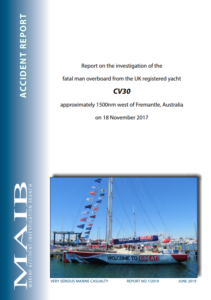The UK MAIB issued an investigation report on the fatal man overboard incident involving the UK registered world racing yacht ‘CV30’ approximately 1500 nm west of Fremantle, Australia. Simon Speirs was initially secured to the yacht, but before he could be recovered his safety tether hook distorted and suddenly released.
The incident
On 18 November 2017, Simon Speirs fell overboard from the foredeck of the Clipper round the world racing yacht CV30 when approximately 1500nm west of Fremantle, Australia.
At the time of the accident the skipper was on the helm and was sailing CV30 downwind, in very rough seas, to facilitate the lowering of the yankee 3 headsail.
Five crew, including Simon, all of whom were secured to the yacht by their tethers, were on the foredeck to haul down and secure the yankee 3.
When the sail was ¾ down a large wave on the port quarter caused CV30 to slew to starboard and then to port, leading the yacht to accidentally gybe.
The bowman fell overboard but was then able to haul himself back onboard.
Shortly afterwards, Simon Speirs fell overboard from his position on the starboard side between the forestays.
The skipper tacked CV30 to place Simon on the high side of the yacht, but he was limited in his ability to slow the yacht due to damage sustained during the accidental gybe.
The bowman was unable to reach Simon, who was being dragged along in the water and buffeted against the yacht’s starboard side.
A halyard was passed to him, but as he struggled to secure it to his lifejacket his tether hook distorted and released.
The yacht’s crew immediately initiated the manoverboard (MOB) recovery procedure.
In the prevailing wind and sea conditions, and without full control of the sails, the skipper managed to manoeuvre CV30 alongside Simon, who appeared to be unconscious, 32 minutes later, but following his recovery he was unable to be resuscitated.
Findings
Some of the findings of the UK MAIB investigation are as follows:
-Simon Speirs fell overboard from the foredeck of CV30 while the crew were in the process of lowering the headsail, an essential task as the wind strength was increasing. However, the foredeck was a vulnerable place for the crew to be operating in the very rough sea conditions given:
- The labour intensive and difficult task of lowering a headsail in strong winds.
- The narrow foredeck and lack of suitable securing points for crews’ short safety tethers.
- On this occasion, the compromised starboard guardrail that had been damaged 14 days earlier.
-Although a temporary repair of CV30’s guardrail was rigged following the stanchion base fracture, the lack of support from the two stanchion bases would have compromised the guardrail’s effectiveness, potentially contributing to Simon falling overboard and hampering his recovery.
-The skipper’s ability to supervise effectively was compromised as he was also the helmsman, a task that was safety critical in itself due to the need to keep the yacht on a steady course to avoid unintentional gybing. Consequently, skippers would benefit from having improved guidance on the crew numbers required to conduct sail change evolutions for a variety of wind and sea conditions to ensure sufficient crew are on deck.
-The required procedure for a tethered MOB was only included in Clipper Ventures’ standard operating procedure, was not included in the race crew manual or wet notes and was generally only talked through, rather than drilled.
-This investigation has concluded that Simon’s tether hook became caught under the starboard forward mooring cleat, resulting in the hook being loaded laterally, distorting and releasing. The importance of the tether hook orientating itself to load the tether longitudinally is specified neither in the tether standard, ISO 12401, nor in the tether’s instructions.
-Simon was attached by his long tether, and the combined effect of the hooking point location and his tether length resulted in him being dragged alongside the yacht, hindering his recovery.
-There were several examples that indicate that preventative maintenance or prerace inspection could have been improved. The resulting issues, while able to be managed at sea by the crew, were unnecessary, and could have been avoided had a more thorough planned maintenance system been in place or some of the issues 64 been solved through improved design. The cumulative effect of the defects was to increase workload for the crew, contributing to their fatigue, lowering morale and detracting from sailing and gaining sailing experience.
Safety issues
- The dangers of lateral loading of tether hooks and the importance of tether securing points arrangement to ensure tether hooks cannot become entangled.
- The importance of adequately risk assessing foredeck operations to ensure sufficient control measures are put in place to keep crew safe.
- Ensuring tethered man overboard recovery procedures are effective and regularly drilled.
- Minimising yacht defects to avoid undue workload for the crew, contributing to their fatigue, lowering morale and increasing the chance of mistakes
Recommendations
UK MAIB made safety recommendations to:
- the BSI Committee, World Sailing and Spinlock regarding updating guidance to raise awareness of the dangers of laterally loading safety tether hooks.
- the Clipper Ventures to review and update its risk assessments and procedures particularly for foredeck operations and methods for recovery of both tethered and untethered man overboards, as well as yacht maintenance and repair aspects.
Safety recommendations shall in no case create a presumption of blame or liability.
Explore more herebelow:































































